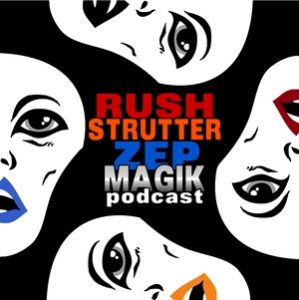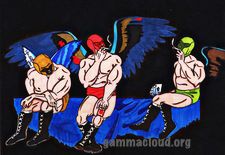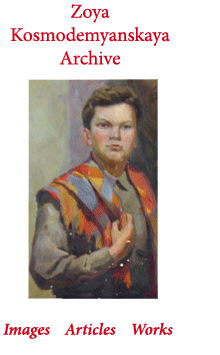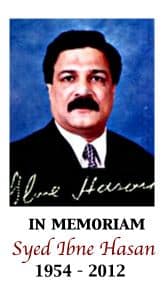Foreword (February 2015)
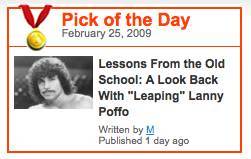 My first-ever “serious” article about pro wrestling was written on a dare by someone who was, at that time, the top-ranked wrestling writer on a sports website that specialized in publishing user-generated content. I took that particular opportunity to wax philosophical about my longstanding appreciation for pro wrestling and added “Q & A” style e-mail interview with one of my childhood favorites, “Leaping” Lanny Poffo. Much to my surprise, the article was voted “Pick of the Day” for the entire site (I even grabbed a screen shot of that distinction for posterity) and less than a year later—after attempting to launch my own wrestling site with a handful of friends—I ended up landing the dream gig of anybody who has ever written about the sport, a spot with Pro Wrestling Illustrated.
My first-ever “serious” article about pro wrestling was written on a dare by someone who was, at that time, the top-ranked wrestling writer on a sports website that specialized in publishing user-generated content. I took that particular opportunity to wax philosophical about my longstanding appreciation for pro wrestling and added “Q & A” style e-mail interview with one of my childhood favorites, “Leaping” Lanny Poffo. Much to my surprise, the article was voted “Pick of the Day” for the entire site (I even grabbed a screen shot of that distinction for posterity) and less than a year later—after attempting to launch my own wrestling site with a handful of friends—I ended up landing the dream gig of anybody who has ever written about the sport, a spot with Pro Wrestling Illustrated.
I met Lanny in person a few years later at an independent show in Chicago but I am not sure if I actually thanked him for helping to launch my writing “career.” But Lanny and I did collaborate again on an article for PWI a few years later following the tragic death of his brother Randy Savage. In 2011, Randy was the posthumous recipient of PWI’s Stanley Weston Lifetime Achievement Award and Lanny graciously provided me with some pleasant reminscences to include in the write-up. It was a surreal experience to have grown up watching Lanny and Randy and then have the honor of penning such a noteworthy piece.
Looking back at the article below, it’s amazing to think that it all started with this…
Originally posted online February 24, 2009.
Part One: Love for the “Old School”
Over the course of last few years, I have finally come to the realization that no matter how old I get, I will never outgrow my love for professional wrestling. Like most longtime fans, I became hooked as a kid and my interest lasted well into my teenage years. As a young adult, my attention shifted to more important things. I got married, landed a real job, started a family, and pursued some post-college studies as well as some other endeavors. I pretty much missed out on most of the “Attitude Era” and the original ECW promotion but then again, I was having a pretty good time doing some grown-up things during those years.
Somewhere along the way to my new life as a responsible adult, I got sucked back in to the world of wrestling. My enthusiasm for the spectacle of pro wrestling came back stronger than ever several years ago and ever since then, I’ve been almost powerless to fight it. It’s like I’ve been caught in a mental hammerlock of sorts. So here I am, a grown man with children of my own and I’m watching hours and hours of wrestling every week, buying action figures and DVDs, and reading news and gossip on Internet wrestling forums.
I think I realized wrestling had become an obsession for me the day I heard my two young daughters trying to sing Rey Mysterio’s theme song. The funny thing of it was that they couldn’t figure out the line “Booyaka, booyaka, 6-1-9” and it somehow came out as “Hoolika, hoolika, one State Farm…” That’s the truth, folks. Funny stuff, indeed.
Anyway, I am certainly enjoying some aspects of today’s pro wrestling scene and I have spent a few years getting caught up on what I missed in the mid to late 1990s. However, there’s a big part of me that longs for the “good old days” when pro wrestling was still considered to be a sport and the rule of something called “kayfabe” still prevailed. I miss the decidedly low-tech entrances, the full-on shoot-style promos and the smash-mouth, in-your-face style of the local organizations and the regional territories. I’m talking about the “old school,” people.
When I was about 10 years old, my family moved to central Kentucky. Up to that point, I was largely unfamiliar with pro wrestling. I think my dad had taken my older brother and me to a live event at Marshall University in Huntington, West Virginia a few years earlier, but this was a special occasion. We hadn’t really seen wrestling on a regular basis on television before then. I vaguely recall that Jimmy “Superfly” Snuka and Andre the Giant were on the card that night, but I was too young to appreciate it all. That would all change a few years later.
Central Kentucky was a hotbed of pro wrestling activity in the early 1980s. The two dominant promotions in the area were Jerry Lawler’s Championship Wrestling out of Memphis, Tennessee and Angelo Poffo’s International Championship Wrestling (ICW). My brother and I picked up on the action pretty quickly. I’m almost positive that the first televised wrestling show I ever saw was an episode of ICW in which “Pistol” Pez Whatley had to wear a mop on his head as a consequence for losing a big match. The studio audience kept chanting “Mop head! Mop head! Mop head!” at Pez and the louder they yelled, the angrier he became, stamping his feet and swinging the mop around on his head. It is fair to say that with this episode, my youthful curiosity was piqued. I was completely and utterly hooked.
Lawler’s Championship Wrestling was a great show, but it was ICW that really captivated me. In fact, some of the kids in our neighborhood started calling me “ICW” because I talked so much about the show (and also probably because they never bothered to learn my real name).
ICW was an exciting show with a brilliant talent roster. “Macho Man” Randy Savage, the son of Angelo Poffo, was one of the biggest stars to come out of the promotion, but in its heyday, ICW featured an impressive collection of seasoned veterans and rising stars. Ox Baker, Ronnie Garvin, “Iron” Mike Sharp, “Cowboy” Bob Orton, The Great Kabuki and Elizabeth Hulette (Miss Elizabeth) all worked in ICW at one time or another.
“Leaping” Lanny Poffo, also the son of promoter Angelo Poffo, was another prominent “main eventer” for ICW. Although Lanny is probably best known for his run in the WWF as the poetic professor “The Genius,” he spent a number of years at the top of the card on television shows and at packed venues throughout Kentucky, Tennessee, and other southern states.
Lanny established himself as a dynamic athlete and performer during his years with ICW. His expertise as a technical wrestler and his unique acrobatic abilities made it possible for Lanny to hold his own with some of the larger wrestlers and legendary talents of the day.
His cerebral approach to promotional spots made his microphone work seem more like legitimate theater and less like the vitriolic tirades that are most commonly associated with “sports entertainment.”
Lanny was one of the most popular babyface wrestlers on the ICW roster for the better part of the promotion’s existence. When ICW folded in 1984, Lanny and his brother Randy Savage went to Championship Wrestling. Managed by the villainous Tux Newman, they wrought havoc throughout the promotion, engaging in long and bloody feuds with the region’s biggest talents, including Jerry Lawler and the legendary Fabulous Ones.
Part Two: Reminiscing with Lanny Poffo
 As a young wrestling fan, I was absolutely thrilled to follow Lanny’s exploits week after week, and I followed his career with great interest for many years. I recently caught up with Lanny through his official website and asked him to spend a few moments reflecting on his early days with ICW and Championship Wrestling. He was kind enough to answer some questions via e-mail for this article.
As a young wrestling fan, I was absolutely thrilled to follow Lanny’s exploits week after week, and I followed his career with great interest for many years. I recently caught up with Lanny through his official website and asked him to spend a few moments reflecting on his early days with ICW and Championship Wrestling. He was kind enough to answer some questions via e-mail for this article.
M: Lanny, these days it seems that a lot of wrestling historians like to refer to International Championship Wrestling as an “outlaw” promotion. Of course, this has a lot to do with the fact that ICW was not affiliated with NWA, but in your opinion was there anything else that made the promotion stand out from those of the neighboring territories?
Lanny: The word outlaw implies that running a rival wrestling promotion is illegal. The NWA was an attempt at a monopoly, which is illegal. Most of those promoters died broke anyway. Crime doesn’t pay.
M: By some accounts, the ICW roster was prone to letting fights spill over out of the ring. I have even read accounts of real-life run-ins and parking lot brawls with wrestlers from the Memphis Championship Wrestling promotion. What was the ICW locker room like during the heyday of the promotion?
Lanny: I was in the babyface locker room. We had Ronnie Garvin, Bob Roop, George Weingeroff, El Bracero, Rick McCord, and others. Our locker room was very happy. Those guys had personality.
M: One of my favorite memories of ICW was your epic feud with “Hustler” Rip Rogers. The buildup to the steel cage, hair vs. hair match at Rupp Arena was tremendous. As you likely recall, your match was the second main event for the evening with the first main event being a bloody cage match between Ratamyas and Randy Savage. To my mind, this was the peak of your run with ICW. What are your reflections on being in the main event that night, and was this the pinnacle of your success with ICW or were there other moments that you think were more important?
Lanny: According to Mick Foley’s book, Rip Rogers was the best worker who never made it. That was true. Rip Rogers was a great athlete and a great worker. He never made it because he was too weird even for this business. That’s a quote from his book. I agree.
Rupp Arena has a lot of prestige. It also has a lot of expenses. It’s a beautiful building but I’m only interested in the bottom line. We did better when we wrestled in Henry Clay High School and let their boosters club sell tickets. That may not seem quite as glamorous, but profits are better than losses when you’re living in the real world.
M: When you moved to Championship Wrestling, you adjusted quickly to a “heel” role. I remember one particular promo in which you wore a suit of armor and stood on a hillside reciting a funny poem about Jerry Lawler. When I go back now and look at footage from your Memphis years, it seems as though you were laying the groundwork for the “Genius” character you portrayed during your run in the WWF. How different was the creative process in the territories compared to your time in the WWF?
Lanny: Not being ugly or crazy looking was a handicap as a heel. I had to go for outlandish ideas.
M: Did the poetry that you wrote come naturally or was it difficult to come up with new and interesting verses week after week? How was it that you came upon the poetic side of your in-ring persona?
Lanny: I met Shel Silverstein twice in my life. He inspired me to write. In the WWF, I had a handicap named chief Jay Strongbow. He knew who I was going to wrestle on TV but never let me know in advance so I could have more time to write a better poem. When I asked him about this he said. “I don’t like your gimmick!” It wasn’t a gimmick. It was real. His name is Joe Scarpa. He’s Italian. He’s not an Indian. that is a gimmick.
M: Your in-ring style has always involved an intriguing mixture of traditional wrestling holds and fast-paced acrobatics. This really helped you to stand out in territories that favored mat-oriented grappling and smash-mouth brawling. How do you think the “Leaping Lanny” character would fare against today’s high-flying superstars like Rey Mysterio?
Lanny: In no way do I consider myself the talent that Rey Mysterio is. The bar has been raised. I’m from the ’80s. He’s the man.
M: On your official website, you discuss your recent endeavors, including your work as a motivational speaker and an author. Would you care to share a bit more regarding your post-wrestling endeavors?
Lanny: I have a tuxedo and love to speak. I’m in my element. It’s my way to make a difference.
M: Thanks very much for taking the time to reminisce with a dedicated fan. Your unique contributions to the spectacle of professional wrestling have given many of us some terrific memories. I wish you the best of luck in all that lies ahead.
Lanny: Wrestling’s been very good to me!
To visit with Lanny and to learn a little bit about his past and present adventures, visit his official website. To learn more about the history of International Championship Wrestling, visit the Kayfabe Memories ICW history archive.
Extra special thanks to Ray for some much-needed editorial assistance.



